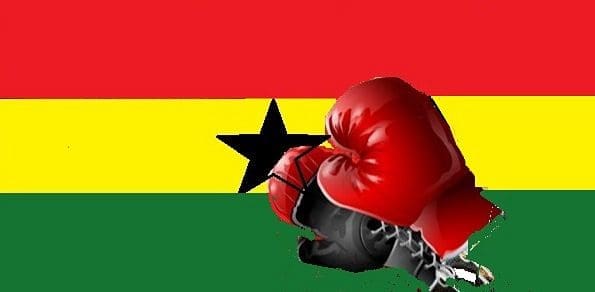Ghana’s boxing community continues mourning Ernest Akushey, known as “Bahubali,” who died on September 23, 2025, at age 27, less than two weeks after suffering a technical knockout defeat that has triggered government intervention into the sport’s governance.
The National Sports Authority (NSA) dissolved the Ghana Boxing Authority (GBA) board on September 25 and established a nine-member Interim Management Committee (IMC) to oversee professional boxing, though the move has sparked controversy among boxing stakeholders who view it as unconstitutional interference.
Sports Minister Kofi Adams officially inaugurated the IMC on September 29, implementing recommendations from a ministerial inquiry into the earlier death of Nigerian boxer Gabriel Oluwasegun Olanrewaju, making Akushey the second fighter to die this year following a bout in Ghana.
Akushey passed away at Korle-Bu Teaching Hospital just eleven days after his September 12 defeat to Jacob Dickson at the Bukom Arena. The circumstances surrounding the fight have raised serious questions about medical protocols and safety standards in Ghanaian boxing.
Speaking on Big Fight Night on Omashi TV, Mubarak Yusif Nanor, a matchmaker with SafeBox Promotions and Legacy Fight Sports Promotions, expressed sadness about the government takeover but indicated he’s watching to see if the IMC fulfills its terms of reference.
Nanor emphasized that his organizations follow strict regulations when organizing events, providing medical documentation for boxers and ensuring adequate security. He stressed that Ghana’s boxing gyms need investment in equipment and insurance coverage.
“We all know life is precious, but boxing is a game of chance and business where anything can happen like any life endeavour, so people should be patient and see what the IMC will bring on board, we are watching,” Nanor said.
However, his relatively measured response contrasts with broader stakeholder opposition. Professional boxing stakeholders including the Professional Boxers Association of Ghana, United Boxing Coaches Association, Boxing Promoters Association and Matchmakers & Agents Association rejected the NSA’s decision during a September 28 meeting, calling it arbitrary and unconstitutional.
The IMC’s mandate includes implementing comprehensive medical protocols, establishing a Medical Commission, and enhancing doping controls in partnership with the National Anti-Doping Agency (NADA). Whether these reforms address the systemic failures that allowed two boxers to die following fights in Ghana this year remains uncertain.
Reports indicate Akushey’s September 12 bout was organized with just two weeks’ notice and lacked proper medical clearance, suggesting that regulatory breakdowns contributed to the tragedy. The fighter had reportedly lost his previous three bouts before the fatal match against Dickson.
Nanor advised the boxing community to remain calm during events related to Akushey’s death, noting that some people are directing accusations at Dickson following the incident. He urged Akushey’s family to await autopsy results before drawing conclusions about responsibility.
The boxing fraternity held a seven-day remembrance vigil for Akushey at Chorkor Tea Garden on Tuesday evening, with another memorial walk planned for Sunday. Akushey has been remembered as an entertaining fighter who attracted fans through his personality, though his recent record showed three consecutive losses.
The government intervention reflects growing pressure to reform Ghana’s boxing governance following the two deaths. However, the constitutional questions raised by stakeholders could complicate the IMC’s legitimacy and ability to implement lasting changes.
Critics argue the NSA’s action contravenes the GBA constitution and could create long-term problems for Ghana’s boxing administration. The tension between government authority to intervene for safety reasons versus boxing stakeholders’ constitutional rights to self-governance presents a legal challenge that may require court resolution.
The timing proves particularly sensitive given that both deaths occurred during an election year, adding political dimensions to what should be purely safety-focused reforms. Whether the IMC represents genuine commitment to boxer safety or politically motivated intervention will likely be judged by its actions rather than its rhetoric.
For Ghanaian boxers, the immediate concern is whether they can continue competing while governance structures remain in flux. Some stakeholders have called for suspending all boxing activities until proper protocols are established, though this could devastate fighters who depend on bouts for income.
The tragedy has also reignited debates about boxing’s inherent dangers versus inadequate safety measures. While boxing carries risks that participants accept, those risks should be minimized through proper medical screening, referee training, ringside emergency care and post-fight monitoring—areas where Ghana’s system appears to have failed.
International boxing organizations are watching Ghana’s response closely. The country has produced world champions and maintains a proud boxing tradition, but repeated deaths could lead to sanctions or restrictions on Ghanaian boxers competing internationally if safety standards aren’t demonstrably improved.
Whether the IMC can navigate these complex challenges while maintaining stakeholder confidence remains to be determined. Nanor’s cautious wait-and-see approach reflects uncertainty within the boxing community about whether this governance upheaval will genuinely improve safety or simply create new administrative complications.
The ultimate measure of success won’t be whether the IMC completes its term and hands over power peacefully, as Nanor hopes, but whether Ghanaian boxers can compete knowing that proper medical protocols and safety standards will protect them as much as humanly possible in an inherently dangerous sport.
Source: newsghana.com.gh










